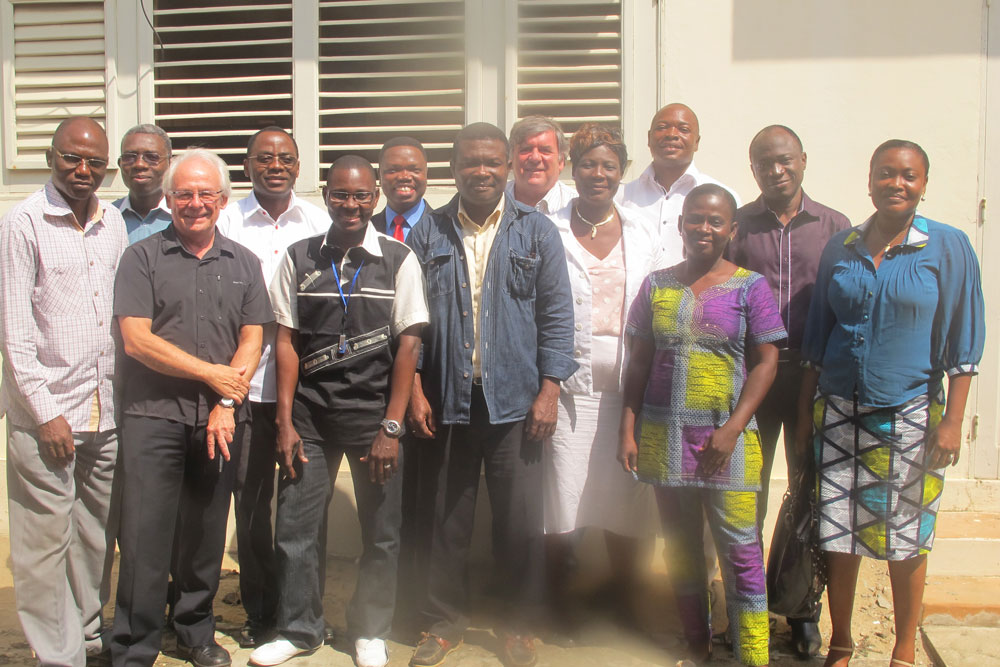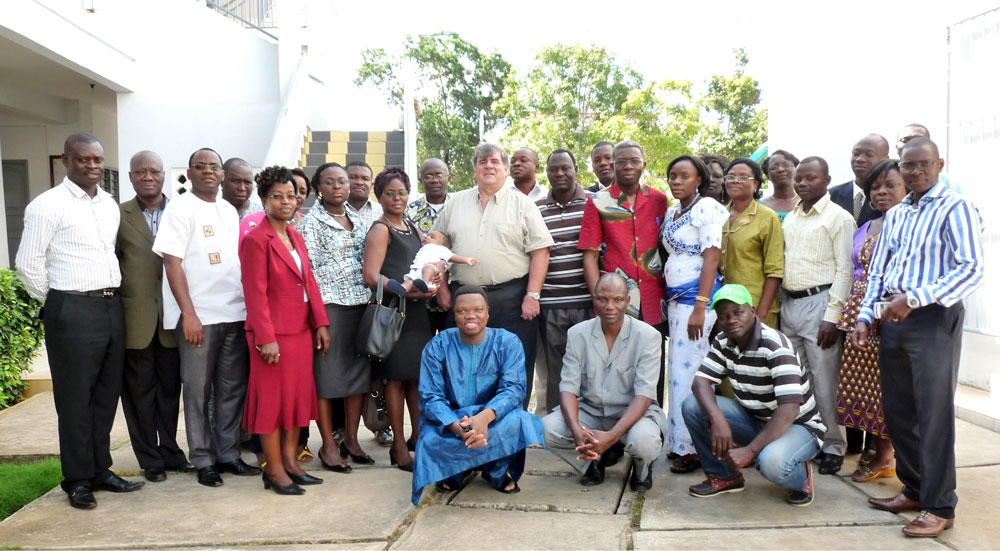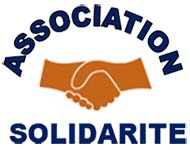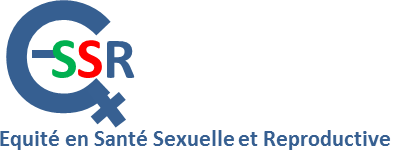Sex workers, marginalization and health
Research approaches to achieving health equity in Benin's sex trade environment
Institutions
- University of Abomey-Calavi (Bénin)
- Laval University, Canada
Nominated Principal Investigator
- Michel Alary, Laval University, Quebec City, Canada
-
Program team
Principal Investigator
- Adolphe Kpatchavi, University of Abomey-Calavi
Abomey-Calavi, Benin
Co-investigators
- Emmanuelle Bédard, University of Quebec at Rimouski
Lévis, Canada - Marie-Pierre Gagnon, Laval University
Quebec City, Canada - Lisa Avery, University of Manitoba
Winnipeg, Canada - Marcel Zannou, University of Abomey-Calavi
Cotonou, Benin
Knowledge users
- Jérôme Charles Sossa, National AIDS Program of Benin
Cotonou, Benin - Joséphat Avocè, OSV/Jordan
Cotonou, Benin
Program staff in Benin
- Fernand Guédou
- Luc Béhanzin
- Victorin Sossoukpè
- Hubert Anani
- Jeannette DaSilveira
- Hervé Thossou
Program staff in Canada
- Christian Lafrance
- Johanne Leroux
- Marylène Dugas
Students and interns in Canada
- Georges Batona
- Fatoumata Korika
Students and interns in Benin
- Timothée Togbé
- Mawoussi Aisségbé
- Mistourath Sacca-Sidi
- Mariette Aikpé
- Egnonam Hadonou
- Adolphe Kpatchavi, University of Abomey-Calavi

Back row, left to right: Fernand Guédou, Adolphe Kpatchavi, Joséphat Avocè, Michel Alary, Hervé Thossou
Front row: Hubert Anani, Christian Lafrance, Georges Batona, Victorin Sossoukpè, Jeannette DaSilveira, Mariette Aikpé, Luc Béhanzin, Mistourath Sacca-Sidi

Program team, Benin
Research objectives
The research team is undertaking a research program whose general objective is to obtain a better understanding of the overall sexual and reproductive health (SRH) of female sex workers in Benin in order to develop, implement and evaluate interventions to prevent HIV and promote SRH among these women. The specific objectives of the program are divided into two components: Understanding and Action.
Approach
The research team is applying the conceptual frameworks of program science to the entire program, using intervention mapping to develop the interventions from the data collected in the Understanding component and Habicht and Victora's approach to conduct the evaluations. To achieve the objectives of the Understanding component, the team conducted a health services survey, a qualitative survey and a second-generation surveillance survey in Year 1 and a quantitative socio-behavioural survey of female sex workers in Year 2. Over the course of the rest of the grant, the team has been working on pre-testing, implementing and evaluating the interventions.
Project update: How can female sex trade workers in Cotonou, Benin, be mobilized to address health and violence?
In addition to their high risk of contracting HIV/AIDs, female sex workers in Cotonou (Republic of Benin, West Africa) suffer a high level of physical, sexual and psychological violence. These issues are generally underestimated and neglected by authorities and the community. Violence, in particular, is often considered to be "part of the job" and goes under-reported by those involved in the trade.
To address these issues and empower the community of approximately 1110 female sex workers living in Cotonou, Dr. Michel Alary and his colleagues working in Africa launched an initiative called Ensemble nous sommes plus fortes. To kick off the program, they hosted a workshop involving 30 sex workers and representatives from organizations working with them to identify their priorities, which included improving the living conditions of sex workers and their families, reducing violence and increasing the use of condoms. Once these priorities were identified, a group of 100 sex worker leaders and peer educators was established to support and advocate for this community. Since then, and thanks to a meeting of 225 female sex workers held in Cotonou in 2014, a self-governing organization of sex workers was created, called Association Solidarité.
To date, the Ensemble nous sommes plus fortes program has led to a number of improvements for this community, such as:
- Brothel owners and bartenders have offered safe spaces for Association Solidarité's meetings;
- Leaders and peer educators organize regular information sessions with female sex workers in their workplaces, including awareness sessions on HIV prevention, family planning and cervical cancer screening. The health information sessions, in particular, have led to increased demand for condoms (from workers) and voluntary visits to health service providers;
- Workers have had the courage to call the vice squad for assistance when faced with aggression from customers, which is a positive new development for this community;
- Meetings are providing women with the opportunity to share their stories about aggression, illness and death with their peers, which ultimately leads to better peer support; and
- Health authorities are increasingly recognizing the need to involve female sex workers in health-related community activities. In addition, Association Solidarité is now involved in the various committees defining HIV/AIDS control strategies in Benin.
The female sex workers of Cotonou now actively negotiate with the owners of their workplaces and with law enforcement forces. They have united against customers who do not want to use condoms and those who use force to have unprotected sex. This research program is successfully empowering these women to identify and manage their social and health problems and is documenting the evolution of Association Solidarité.


Associated links
Selected publications
- Semini I, Batona G, Lafrance C, Kessou L, Gbedji E, Anani H, Alary M. Implementing for Results: Program Analysis of the HIV/STI Interventions for Sex Workers in Benin. AIDS Care 2013; 25(suppl 1):S30-S39.
- Tounkara FK, Diabaté S, Guédou FA, Ahoussinou C, Kintin F, Zannou DM, Kpatchavi A, Bédard E, Bitera R, Alary M. Violence, condom breakage and HIV infection among female sex workers in Benin, West Africa. Sex TransmDis 2014;41(5):312-318. doi: 10.1097/OLQ.0000000000000114.
- Dugas M, Bédard E, Batona G, Kpatchavi AC, Guédou F, Dubé E, Alary M. Outreach Strategies for the Promotion of HIV Testing and Care: Closing the Gap Between Health Services and Female Sex Workers in Benin. J Acquir Immune Defic Syndr 2015;68(Supp 2):S198-S205.
- Batona G, Gagnon MP, Simonyan DA, Guedou FA, Alary M. Understanding the intention to undergo regular HIV testing among female sex workers in Benin: A key issue for entry into HIV care. J Acquir Immune Defic Syndr 2015;68(Supp 2):S206-S212.
- Kpatchavi AC, Togbé TC, Bédard E, Dugas M, Batona G, Guédou F, Alary M. Les déterminants de la mobilité des travailleuses de sexe et prévention du VIH au Bénin : ethnographie des sites de prostitution à partir d'une enquête qualitative dans le cadre du projet « équité en santé ». Revue du CAMES - Sciences humaines 2015; 5:29-45.
- Date modified: